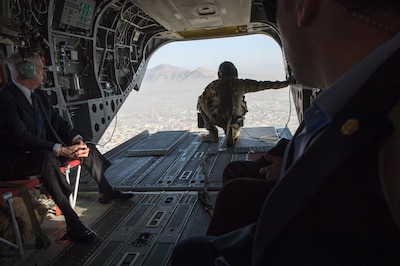By Terri Moon Cronk DoD News, Defense Media Activity
WASHINGTON, Oct. 30, 2017 — The 2001 and 2002 Authorizations
for Use of Military Force remain sound bases for ongoing U.S. military
operations against the mutating threat of terrorism fueled by extremism aimed
at innocents around the globe, Defense Secretary Jim Mattis said on Capitol
Hill this evening.
Appearing with State Secretary Rex Tillerson before the
Senate Foreign Relations Committee, Mattis testified on use of the AUMFs, under
which the U.S. military has been operating since the bills were passed in 2001
and 2002.
In the aftermath of the deadly 9/11 attack on the United
States, and to prevent future acts of international terrorism against the
nation, Congress passed the 2001 AUMF, finding the president has, “’authority
under the Constitution to take action to deter and prevent acts of
international terrorism against the United States,” Mattis said, quoting the
authority.
The 2002 AUMF gives the president authority to, “’defend the
national security of the United States against the continuing threat posed by
Iraq,’” he again quoted.
Previous administrations have cited the statutory
authorities to address the threats posed by terrorist groups in Iraq and Syria,
the secretary said, noting that historically, “it lies firmly within any
president’s constitutional authority and responsibility as the elected
commander-in-chief to designate who presents a threat to our country.”
And to date, he added, the Article II authority, reinforced
by the 2001 and 2002 AUMFs, has been used to take action against al-Qaida, the
Taliban, the Islamic State of Iraq and Syria and associated forces.
Congressional Support
“Though a statement of continued Congressional support would
be welcome,” Mattis said, “a new AUMF is not legally required to address the
continuing threat posed by al-Qaida, the Taliban and ISIS.”
Article II of the Constitution and both AUMFs, “provide
safe, sufficient legal authority for us to engage and defeat the current threat
-- which we are doing by working by, with and through our allies and partners,”
Mattis said.
“Any new Congressional expression of unity, whether or not
an AUMF, would present a strong statement to the world of America’s
determination, demonstrating – as Sen. [Tim] Kaine has stated,” the secretary
said, ‘an important message of resolve to the American public and our troops that
we stand behind them in their mission.’”
A New AUMF
The secretary emphasized that to successfully prosecute the
counterterrorism campaign, any debate on a new or revised AUMF must contain
three factors:
First, he said, the two AUMFs should not be repealed, and
after several court cases and debates, all three branches of government seem to
agree that both have sufficient authority to prosecute operations against
al-Qaida, the Taliban, and ISIS.
“Repealing the 2001 and 2002 AUMFs would only cause unnecessary
policy and legal uncertainty, which could lead to additional litigation and
public doubt.”
Further, such repeals would signal our enemies and allies we
are backing away from the fight, Mattis said.
“It would stall our operations, immediately reduce allied
commitments and support, and create significant opportunities for our enemies
to seize the initiative,” he said.
Repeals of the AUMFs without new authorities would also
deprive the U.S. of the ability to detain dangerous enemy combatants who could
be released to fight again, the secretary added.
Second, a new AUMF cannot be time-restricted, the defense
secretary said.
“We cannot put a firm timeline on conflict against an
adaptive enemy who would hope that we haven’t the will to fight as long as
necessary,” Mattis testified. “Instead, we must recognize that we are in an era
of frequent skirmishing and we are more likely to end this fight sooner if we
don’t tell our adversary the day we intend to stop fighting.”
A conditions-based AUMF would not lessen Congress’
authority, and the purse strings lie in Congress’ hands if the executive branch
“does not present a persuasive case for continuing the campaign,” he said.
And finally, a new AUMF cannot be geographically
constrained, the defense secretary said.
“As has been stated, these are not traditional threats,”
Mattis said. “This is a fight against a transnational enemy, one that does not
respect international borders and does not place geographic limits on their
areas of operations. So, necessarily, to defend our country, we must be
prepared to swiftly engage this global enemy in conjunction with our allies and
partners..”
“As as our troops on the battlefield carry out the last 300
meters of American foreign policy to protect our way of life,” he said, “I ask
Congress for your continued support and commitment to ensure we retain the
necessary authorities to take our own side in this fight.”







No comments:
Post a Comment